A Study: Organizational Culture Impact on Employee Performance in UK
VerifiedAdded on 2023/04/20
|83
|20157
|273
Project
AI Summary
This dissertation investigates the impact of organizational culture on employee performance within the UK retail sector, using John Lewis & Partners as a case study. The study explores the relationship between organizational culture and employee performance, examining factors such as leadership style, HRM practices, and workplace environment. It addresses the problem of declining employee performance in the face of increased competition and changing incentive structures. The research employs a quantitative methodology, analyzing data to identify correlations and provide recommendations for enhancing organizational culture and improving employee productivity. The study aims to evaluate factors affecting organizational culture and employee performance, understand the correlation between these factors, and suggest ways to enhance culture for improved performance and attainment of organizational goals. The findings reveal a significant impact of organizational culture on employee performance, offering valuable insights for organizations seeking to improve their workforce productivity and achieve their strategic objectives. The reflective report provides a personal account of the research process, highlighting the challenges and learning experiences encountered during the study.
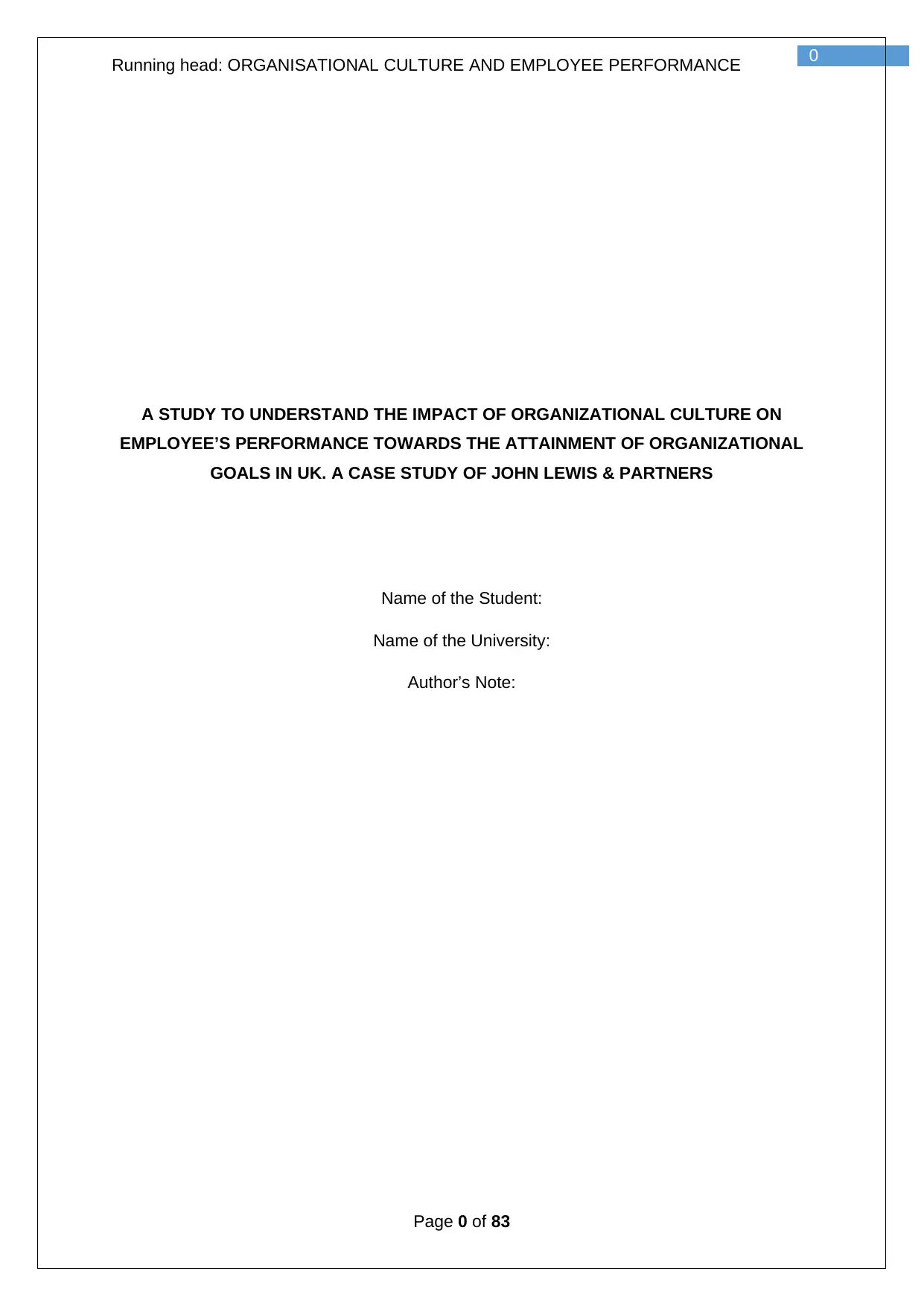
0
Running head: ORGANISATIONAL CULTURE AND EMPLOYEE PERFORMANCE
A STUDY TO UNDERSTAND THE IMPACT OF ORGANIZATIONAL CULTURE ON
EMPLOYEE’S PERFORMANCE TOWARDS THE ATTAINMENT OF ORGANIZATIONAL
GOALS IN UK. A CASE STUDY OF JOHN LEWIS & PARTNERS
Name of the Student:
Name of the University:
Author’s Note:
Page 0 of 83
Running head: ORGANISATIONAL CULTURE AND EMPLOYEE PERFORMANCE
A STUDY TO UNDERSTAND THE IMPACT OF ORGANIZATIONAL CULTURE ON
EMPLOYEE’S PERFORMANCE TOWARDS THE ATTAINMENT OF ORGANIZATIONAL
GOALS IN UK. A CASE STUDY OF JOHN LEWIS & PARTNERS
Name of the Student:
Name of the University:
Author’s Note:
Page 0 of 83
Paraphrase This Document
Need a fresh take? Get an instant paraphrase of this document with our AI Paraphraser
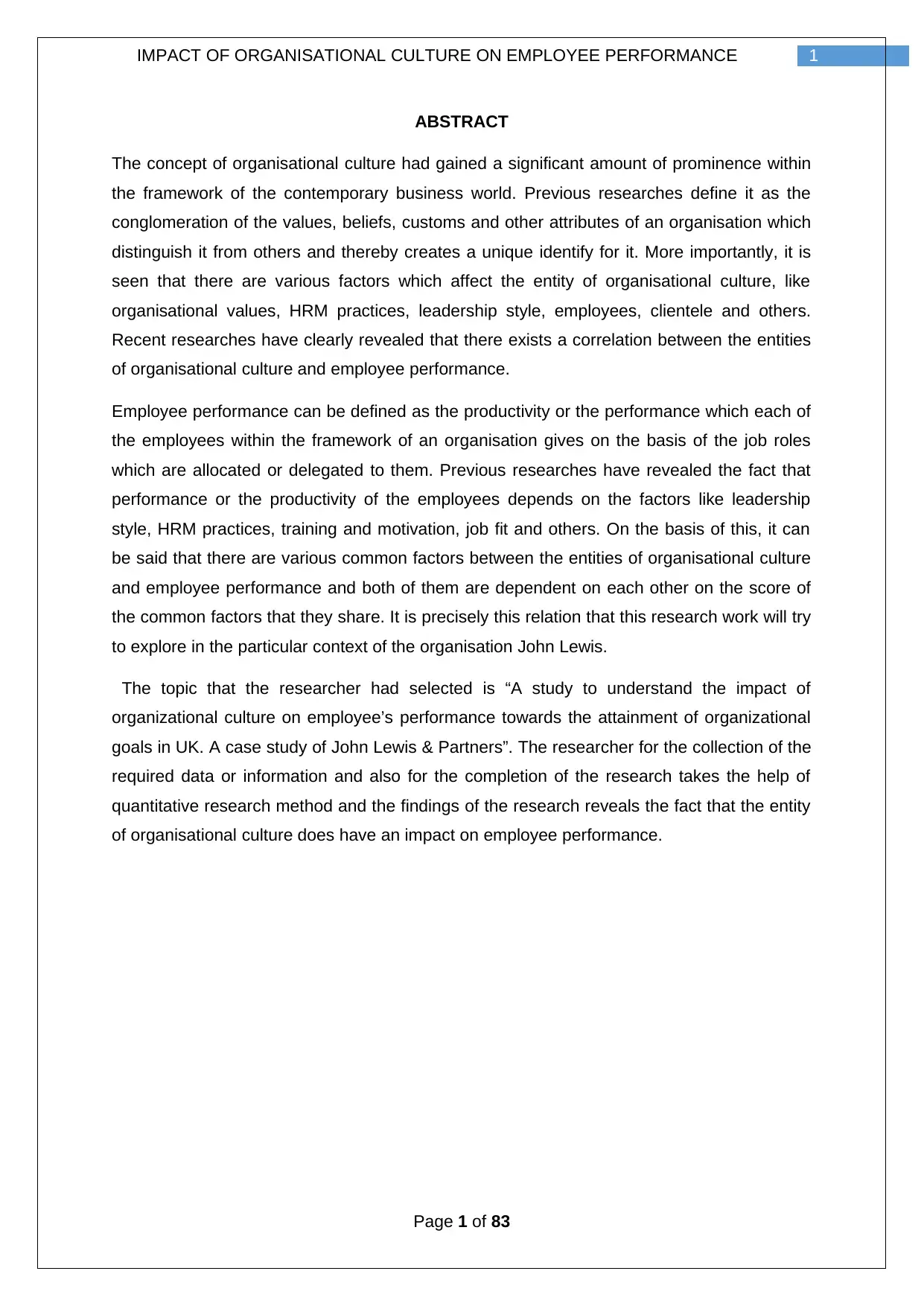
1IMPACT OF ORGANISATIONAL CULTURE ON EMPLOYEE PERFORMANCE
ABSTRACT
The concept of organisational culture had gained a significant amount of prominence within
the framework of the contemporary business world. Previous researches define it as the
conglomeration of the values, beliefs, customs and other attributes of an organisation which
distinguish it from others and thereby creates a unique identify for it. More importantly, it is
seen that there are various factors which affect the entity of organisational culture, like
organisational values, HRM practices, leadership style, employees, clientele and others.
Recent researches have clearly revealed that there exists a correlation between the entities
of organisational culture and employee performance.
Employee performance can be defined as the productivity or the performance which each of
the employees within the framework of an organisation gives on the basis of the job roles
which are allocated or delegated to them. Previous researches have revealed the fact that
performance or the productivity of the employees depends on the factors like leadership
style, HRM practices, training and motivation, job fit and others. On the basis of this, it can
be said that there are various common factors between the entities of organisational culture
and employee performance and both of them are dependent on each other on the score of
the common factors that they share. It is precisely this relation that this research work will try
to explore in the particular context of the organisation John Lewis.
The topic that the researcher had selected is “A study to understand the impact of
organizational culture on employee’s performance towards the attainment of organizational
goals in UK. A case study of John Lewis & Partners”. The researcher for the collection of the
required data or information and also for the completion of the research takes the help of
quantitative research method and the findings of the research reveals the fact that the entity
of organisational culture does have an impact on employee performance.
Page 1 of 83
ABSTRACT
The concept of organisational culture had gained a significant amount of prominence within
the framework of the contemporary business world. Previous researches define it as the
conglomeration of the values, beliefs, customs and other attributes of an organisation which
distinguish it from others and thereby creates a unique identify for it. More importantly, it is
seen that there are various factors which affect the entity of organisational culture, like
organisational values, HRM practices, leadership style, employees, clientele and others.
Recent researches have clearly revealed that there exists a correlation between the entities
of organisational culture and employee performance.
Employee performance can be defined as the productivity or the performance which each of
the employees within the framework of an organisation gives on the basis of the job roles
which are allocated or delegated to them. Previous researches have revealed the fact that
performance or the productivity of the employees depends on the factors like leadership
style, HRM practices, training and motivation, job fit and others. On the basis of this, it can
be said that there are various common factors between the entities of organisational culture
and employee performance and both of them are dependent on each other on the score of
the common factors that they share. It is precisely this relation that this research work will try
to explore in the particular context of the organisation John Lewis.
The topic that the researcher had selected is “A study to understand the impact of
organizational culture on employee’s performance towards the attainment of organizational
goals in UK. A case study of John Lewis & Partners”. The researcher for the collection of the
required data or information and also for the completion of the research takes the help of
quantitative research method and the findings of the research reveals the fact that the entity
of organisational culture does have an impact on employee performance.
Page 1 of 83
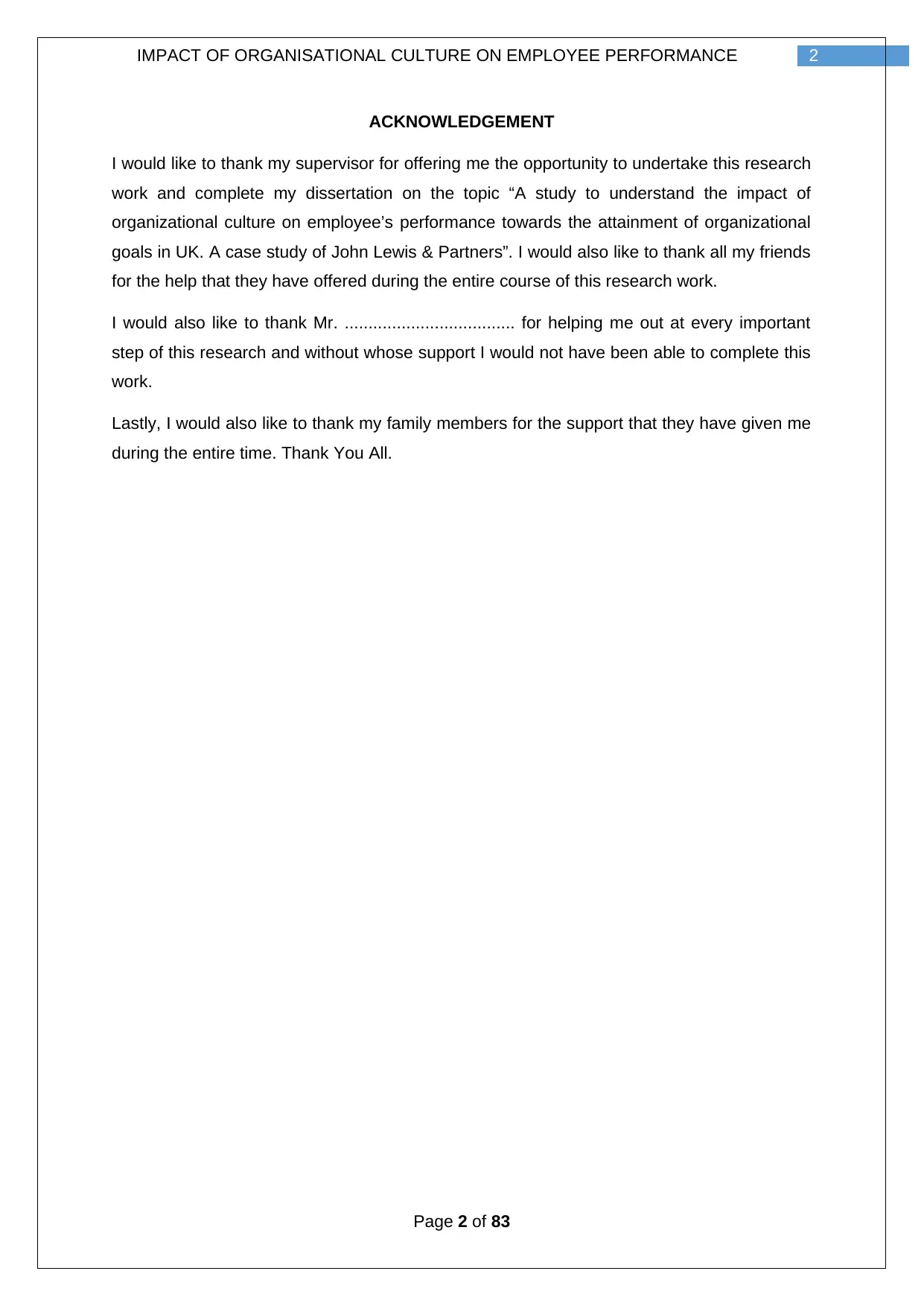
2IMPACT OF ORGANISATIONAL CULTURE ON EMPLOYEE PERFORMANCE
ACKNOWLEDGEMENT
I would like to thank my supervisor for offering me the opportunity to undertake this research
work and complete my dissertation on the topic “A study to understand the impact of
organizational culture on employee’s performance towards the attainment of organizational
goals in UK. A case study of John Lewis & Partners”. I would also like to thank all my friends
for the help that they have offered during the entire course of this research work.
I would also like to thank Mr. .................................... for helping me out at every important
step of this research and without whose support I would not have been able to complete this
work.
Lastly, I would also like to thank my family members for the support that they have given me
during the entire time. Thank You All.
Page 2 of 83
ACKNOWLEDGEMENT
I would like to thank my supervisor for offering me the opportunity to undertake this research
work and complete my dissertation on the topic “A study to understand the impact of
organizational culture on employee’s performance towards the attainment of organizational
goals in UK. A case study of John Lewis & Partners”. I would also like to thank all my friends
for the help that they have offered during the entire course of this research work.
I would also like to thank Mr. .................................... for helping me out at every important
step of this research and without whose support I would not have been able to complete this
work.
Lastly, I would also like to thank my family members for the support that they have given me
during the entire time. Thank You All.
Page 2 of 83
⊘ This is a preview!⊘
Do you want full access?
Subscribe today to unlock all pages.

Trusted by 1+ million students worldwide
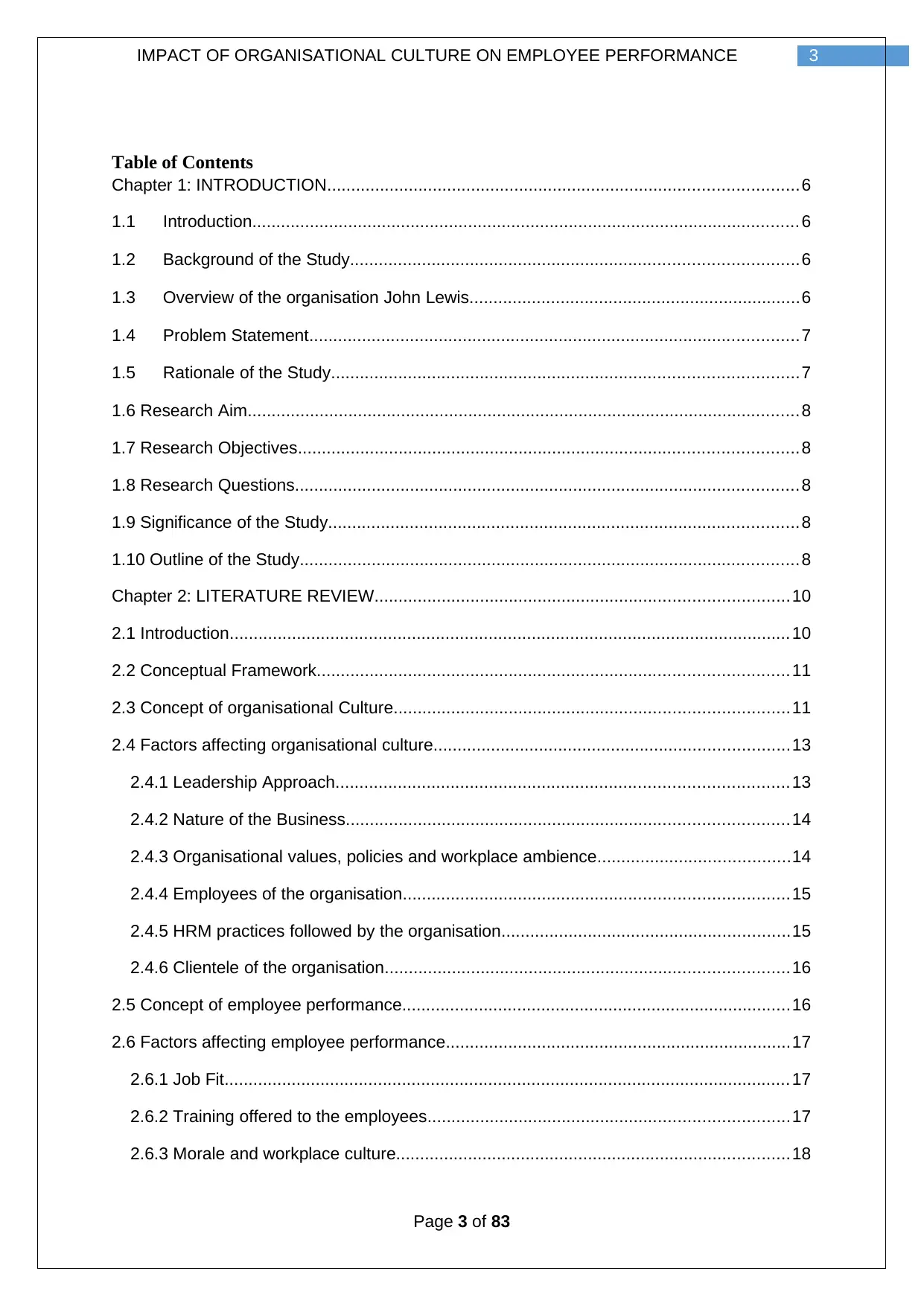
3IMPACT OF ORGANISATIONAL CULTURE ON EMPLOYEE PERFORMANCE
Table of Contents
Chapter 1: INTRODUCTION..................................................................................................6
1.1 Introduction.................................................................................................................. 6
1.2 Background of the Study.............................................................................................6
1.3 Overview of the organisation John Lewis.....................................................................6
1.4 Problem Statement......................................................................................................7
1.5 Rationale of the Study.................................................................................................7
1.6 Research Aim...................................................................................................................8
1.7 Research Objectives........................................................................................................8
1.8 Research Questions.........................................................................................................8
1.9 Significance of the Study..................................................................................................8
1.10 Outline of the Study........................................................................................................8
Chapter 2: LITERATURE REVIEW......................................................................................10
2.1 Introduction..................................................................................................................... 10
2.2 Conceptual Framework..................................................................................................11
2.3 Concept of organisational Culture..................................................................................11
2.4 Factors affecting organisational culture..........................................................................13
2.4.1 Leadership Approach..............................................................................................13
2.4.2 Nature of the Business............................................................................................14
2.4.3 Organisational values, policies and workplace ambience........................................14
2.4.4 Employees of the organisation................................................................................15
2.4.5 HRM practices followed by the organisation............................................................15
2.4.6 Clientele of the organisation....................................................................................16
2.5 Concept of employee performance.................................................................................16
2.6 Factors affecting employee performance........................................................................17
2.6.1 Job Fit...................................................................................................................... 17
2.6.2 Training offered to the employees...........................................................................17
2.6.3 Morale and workplace culture..................................................................................18
Page 3 of 83
Table of Contents
Chapter 1: INTRODUCTION..................................................................................................6
1.1 Introduction.................................................................................................................. 6
1.2 Background of the Study.............................................................................................6
1.3 Overview of the organisation John Lewis.....................................................................6
1.4 Problem Statement......................................................................................................7
1.5 Rationale of the Study.................................................................................................7
1.6 Research Aim...................................................................................................................8
1.7 Research Objectives........................................................................................................8
1.8 Research Questions.........................................................................................................8
1.9 Significance of the Study..................................................................................................8
1.10 Outline of the Study........................................................................................................8
Chapter 2: LITERATURE REVIEW......................................................................................10
2.1 Introduction..................................................................................................................... 10
2.2 Conceptual Framework..................................................................................................11
2.3 Concept of organisational Culture..................................................................................11
2.4 Factors affecting organisational culture..........................................................................13
2.4.1 Leadership Approach..............................................................................................13
2.4.2 Nature of the Business............................................................................................14
2.4.3 Organisational values, policies and workplace ambience........................................14
2.4.4 Employees of the organisation................................................................................15
2.4.5 HRM practices followed by the organisation............................................................15
2.4.6 Clientele of the organisation....................................................................................16
2.5 Concept of employee performance.................................................................................16
2.6 Factors affecting employee performance........................................................................17
2.6.1 Job Fit...................................................................................................................... 17
2.6.2 Training offered to the employees...........................................................................17
2.6.3 Morale and workplace culture..................................................................................18
Page 3 of 83
Paraphrase This Document
Need a fresh take? Get an instant paraphrase of this document with our AI Paraphraser
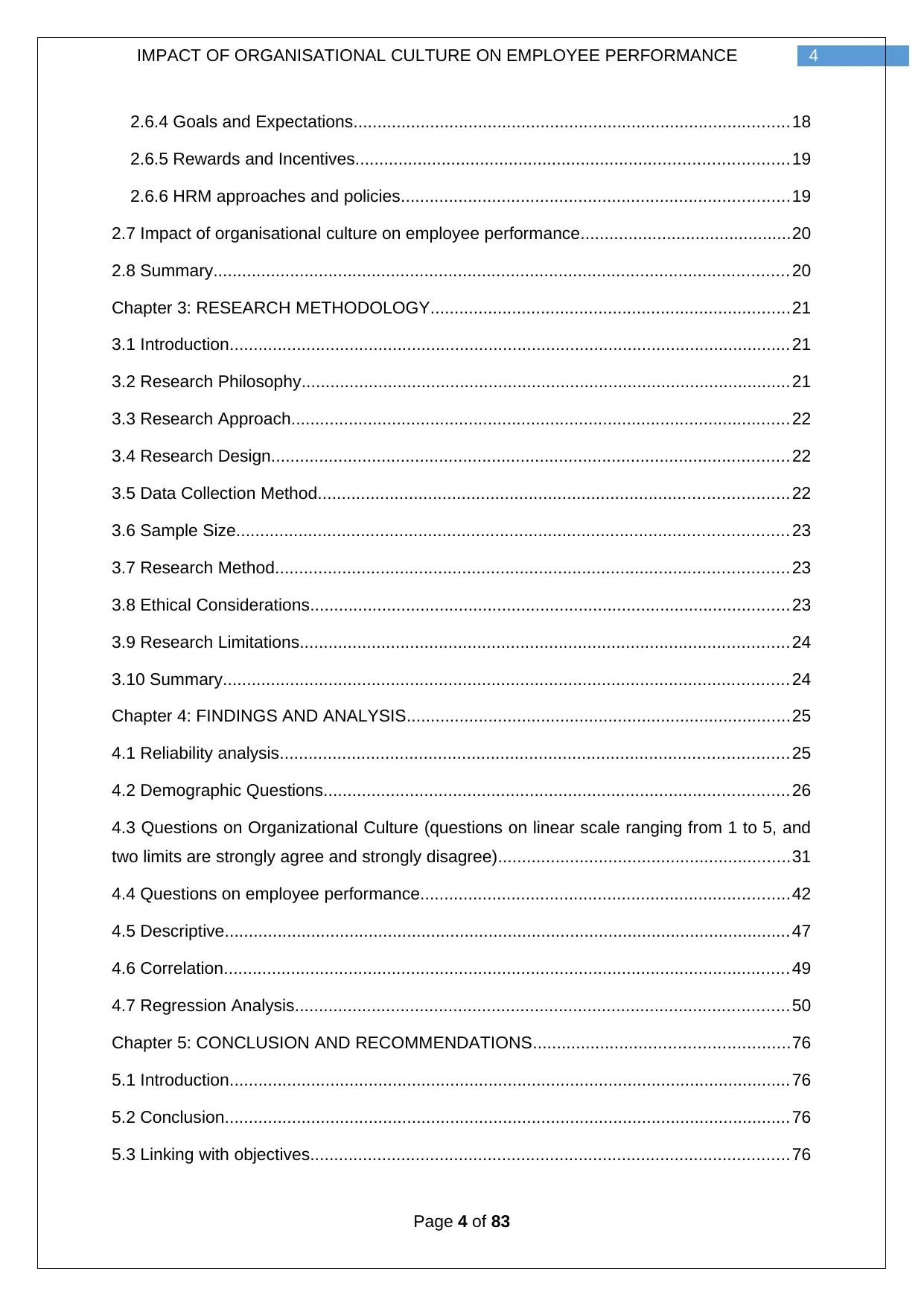
4IMPACT OF ORGANISATIONAL CULTURE ON EMPLOYEE PERFORMANCE
2.6.4 Goals and Expectations...........................................................................................18
2.6.5 Rewards and Incentives..........................................................................................19
2.6.6 HRM approaches and policies.................................................................................19
2.7 Impact of organisational culture on employee performance............................................20
2.8 Summary........................................................................................................................ 20
Chapter 3: RESEARCH METHODOLOGY...........................................................................21
3.1 Introduction..................................................................................................................... 21
3.2 Research Philosophy......................................................................................................21
3.3 Research Approach........................................................................................................22
3.4 Research Design............................................................................................................ 22
3.5 Data Collection Method..................................................................................................22
3.6 Sample Size................................................................................................................... 23
3.7 Research Method........................................................................................................... 23
3.8 Ethical Considerations....................................................................................................23
3.9 Research Limitations......................................................................................................24
3.10 Summary...................................................................................................................... 24
Chapter 4: FINDINGS AND ANALYSIS................................................................................25
4.1 Reliability analysis..........................................................................................................25
4.2 Demographic Questions.................................................................................................26
4.3 Questions on Organizational Culture (questions on linear scale ranging from 1 to 5, and
two limits are strongly agree and strongly disagree).............................................................31
4.4 Questions on employee performance.............................................................................42
4.5 Descriptive...................................................................................................................... 47
4.6 Correlation...................................................................................................................... 49
4.7 Regression Analysis.......................................................................................................50
Chapter 5: CONCLUSION AND RECOMMENDATIONS.....................................................76
5.1 Introduction..................................................................................................................... 76
5.2 Conclusion...................................................................................................................... 76
5.3 Linking with objectives....................................................................................................76
Page 4 of 83
2.6.4 Goals and Expectations...........................................................................................18
2.6.5 Rewards and Incentives..........................................................................................19
2.6.6 HRM approaches and policies.................................................................................19
2.7 Impact of organisational culture on employee performance............................................20
2.8 Summary........................................................................................................................ 20
Chapter 3: RESEARCH METHODOLOGY...........................................................................21
3.1 Introduction..................................................................................................................... 21
3.2 Research Philosophy......................................................................................................21
3.3 Research Approach........................................................................................................22
3.4 Research Design............................................................................................................ 22
3.5 Data Collection Method..................................................................................................22
3.6 Sample Size................................................................................................................... 23
3.7 Research Method........................................................................................................... 23
3.8 Ethical Considerations....................................................................................................23
3.9 Research Limitations......................................................................................................24
3.10 Summary...................................................................................................................... 24
Chapter 4: FINDINGS AND ANALYSIS................................................................................25
4.1 Reliability analysis..........................................................................................................25
4.2 Demographic Questions.................................................................................................26
4.3 Questions on Organizational Culture (questions on linear scale ranging from 1 to 5, and
two limits are strongly agree and strongly disagree).............................................................31
4.4 Questions on employee performance.............................................................................42
4.5 Descriptive...................................................................................................................... 47
4.6 Correlation...................................................................................................................... 49
4.7 Regression Analysis.......................................................................................................50
Chapter 5: CONCLUSION AND RECOMMENDATIONS.....................................................76
5.1 Introduction..................................................................................................................... 76
5.2 Conclusion...................................................................................................................... 76
5.3 Linking with objectives....................................................................................................76
Page 4 of 83
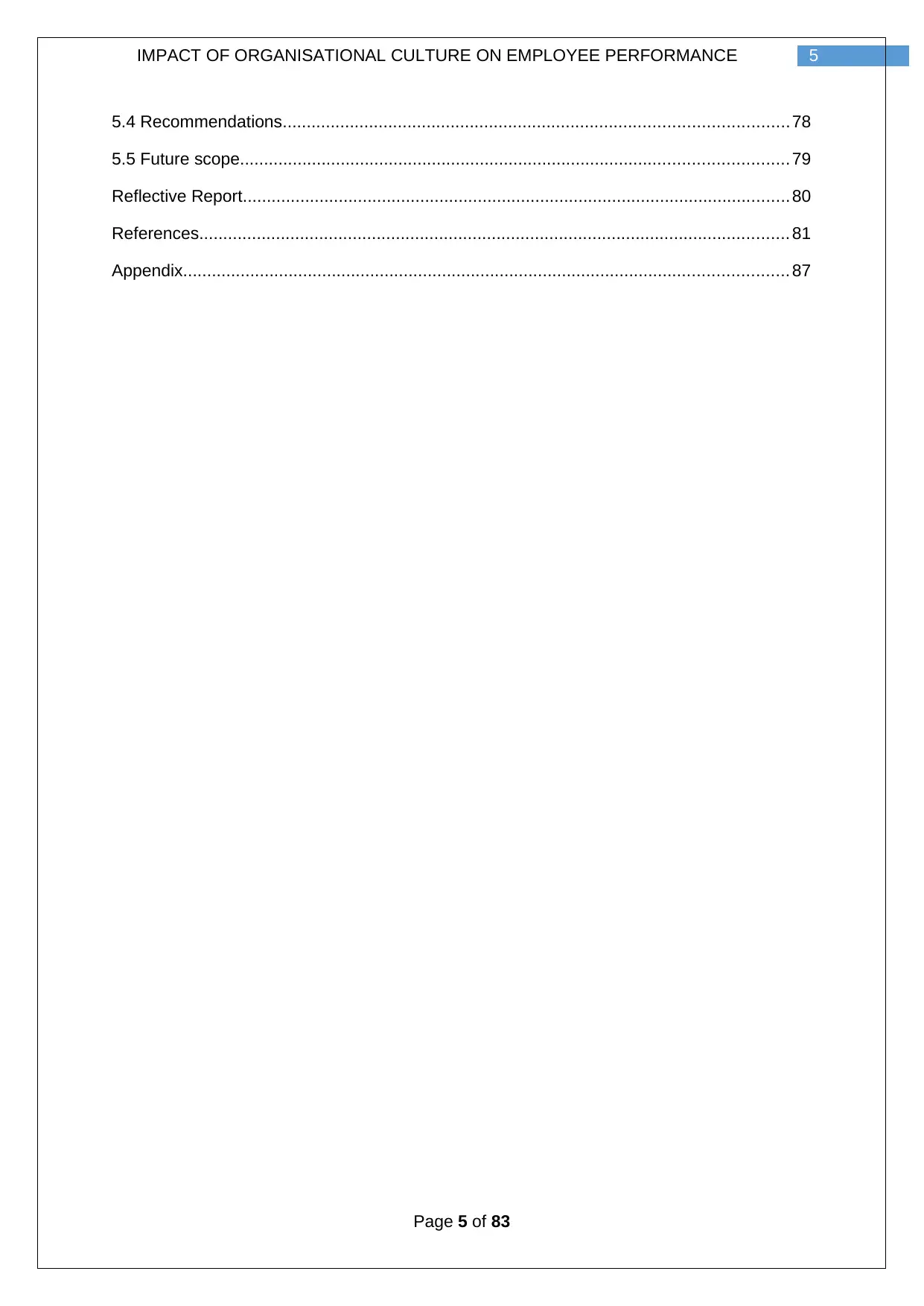
5IMPACT OF ORGANISATIONAL CULTURE ON EMPLOYEE PERFORMANCE
5.4 Recommendations.........................................................................................................78
5.5 Future scope.................................................................................................................. 79
Reflective Report.................................................................................................................. 80
References........................................................................................................................... 81
Appendix.............................................................................................................................. 87
Page 5 of 83
5.4 Recommendations.........................................................................................................78
5.5 Future scope.................................................................................................................. 79
Reflective Report.................................................................................................................. 80
References........................................................................................................................... 81
Appendix.............................................................................................................................. 87
Page 5 of 83
⊘ This is a preview!⊘
Do you want full access?
Subscribe today to unlock all pages.

Trusted by 1+ million students worldwide
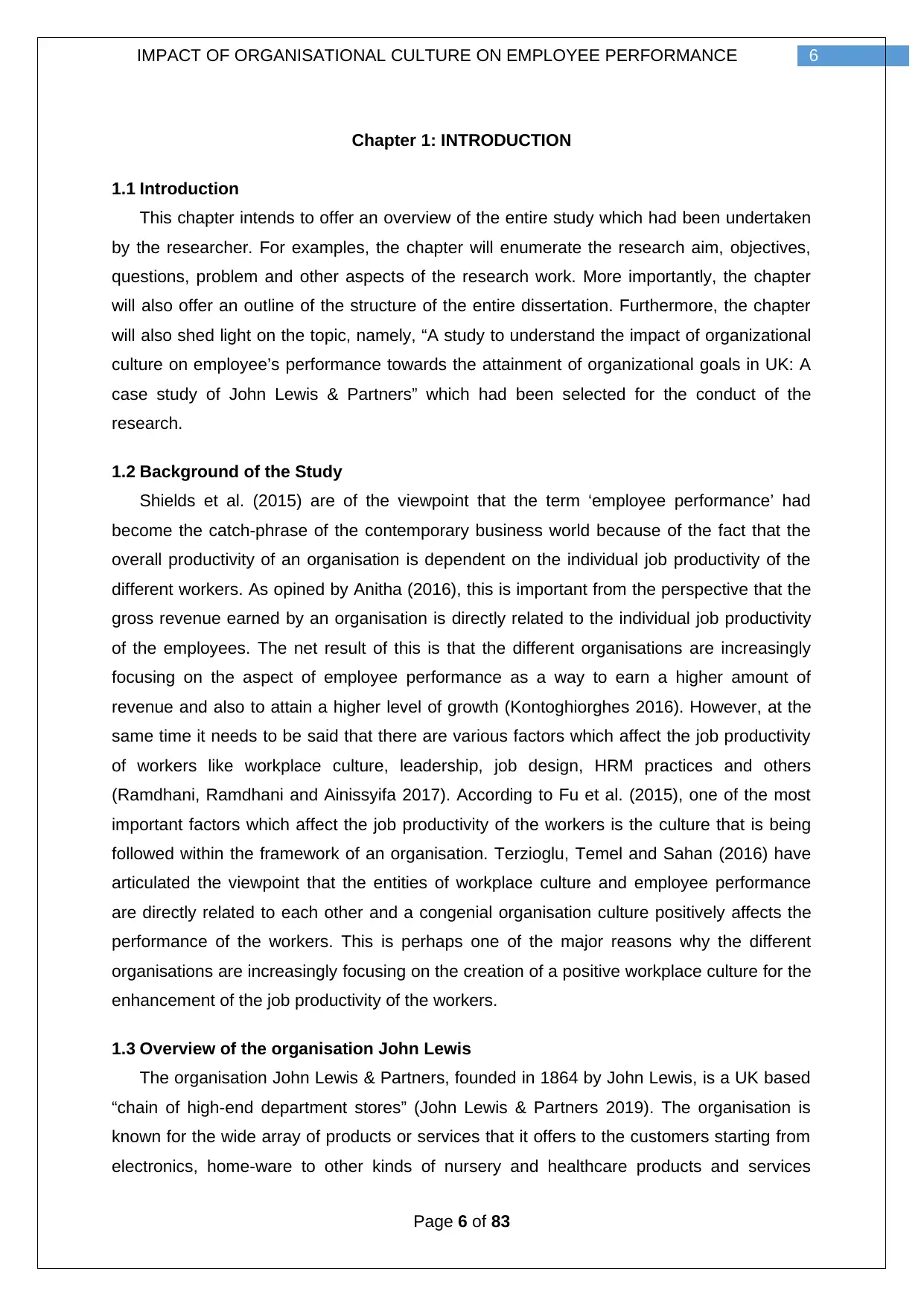
6IMPACT OF ORGANISATIONAL CULTURE ON EMPLOYEE PERFORMANCE
Chapter 1: INTRODUCTION
1.1 Introduction
This chapter intends to offer an overview of the entire study which had been undertaken
by the researcher. For examples, the chapter will enumerate the research aim, objectives,
questions, problem and other aspects of the research work. More importantly, the chapter
will also offer an outline of the structure of the entire dissertation. Furthermore, the chapter
will also shed light on the topic, namely, “A study to understand the impact of organizational
culture on employee’s performance towards the attainment of organizational goals in UK: A
case study of John Lewis & Partners” which had been selected for the conduct of the
research.
1.2 Background of the Study
Shields et al. (2015) are of the viewpoint that the term ‘employee performance’ had
become the catch-phrase of the contemporary business world because of the fact that the
overall productivity of an organisation is dependent on the individual job productivity of the
different workers. As opined by Anitha (2016), this is important from the perspective that the
gross revenue earned by an organisation is directly related to the individual job productivity
of the employees. The net result of this is that the different organisations are increasingly
focusing on the aspect of employee performance as a way to earn a higher amount of
revenue and also to attain a higher level of growth (Kontoghiorghes 2016). However, at the
same time it needs to be said that there are various factors which affect the job productivity
of workers like workplace culture, leadership, job design, HRM practices and others
(Ramdhani, Ramdhani and Ainissyifa 2017). According to Fu et al. (2015), one of the most
important factors which affect the job productivity of the workers is the culture that is being
followed within the framework of an organisation. Terzioglu, Temel and Sahan (2016) have
articulated the viewpoint that the entities of workplace culture and employee performance
are directly related to each other and a congenial organisation culture positively affects the
performance of the workers. This is perhaps one of the major reasons why the different
organisations are increasingly focusing on the creation of a positive workplace culture for the
enhancement of the job productivity of the workers.
1.3 Overview of the organisation John Lewis
The organisation John Lewis & Partners, founded in 1864 by John Lewis, is a UK based
“chain of high-end department stores” (John Lewis & Partners 2019). The organisation is
known for the wide array of products or services that it offers to the customers starting from
electronics, home-ware to other kinds of nursery and healthcare products and services
Page 6 of 83
Chapter 1: INTRODUCTION
1.1 Introduction
This chapter intends to offer an overview of the entire study which had been undertaken
by the researcher. For examples, the chapter will enumerate the research aim, objectives,
questions, problem and other aspects of the research work. More importantly, the chapter
will also offer an outline of the structure of the entire dissertation. Furthermore, the chapter
will also shed light on the topic, namely, “A study to understand the impact of organizational
culture on employee’s performance towards the attainment of organizational goals in UK: A
case study of John Lewis & Partners” which had been selected for the conduct of the
research.
1.2 Background of the Study
Shields et al. (2015) are of the viewpoint that the term ‘employee performance’ had
become the catch-phrase of the contemporary business world because of the fact that the
overall productivity of an organisation is dependent on the individual job productivity of the
different workers. As opined by Anitha (2016), this is important from the perspective that the
gross revenue earned by an organisation is directly related to the individual job productivity
of the employees. The net result of this is that the different organisations are increasingly
focusing on the aspect of employee performance as a way to earn a higher amount of
revenue and also to attain a higher level of growth (Kontoghiorghes 2016). However, at the
same time it needs to be said that there are various factors which affect the job productivity
of workers like workplace culture, leadership, job design, HRM practices and others
(Ramdhani, Ramdhani and Ainissyifa 2017). According to Fu et al. (2015), one of the most
important factors which affect the job productivity of the workers is the culture that is being
followed within the framework of an organisation. Terzioglu, Temel and Sahan (2016) have
articulated the viewpoint that the entities of workplace culture and employee performance
are directly related to each other and a congenial organisation culture positively affects the
performance of the workers. This is perhaps one of the major reasons why the different
organisations are increasingly focusing on the creation of a positive workplace culture for the
enhancement of the job productivity of the workers.
1.3 Overview of the organisation John Lewis
The organisation John Lewis & Partners, founded in 1864 by John Lewis, is a UK based
“chain of high-end department stores” (John Lewis & Partners 2019). The organisation is
known for the wide array of products or services that it offers to the customers starting from
electronics, home-ware to other kinds of nursery and healthcare products and services
Page 6 of 83
Paraphrase This Document
Need a fresh take? Get an instant paraphrase of this document with our AI Paraphraser
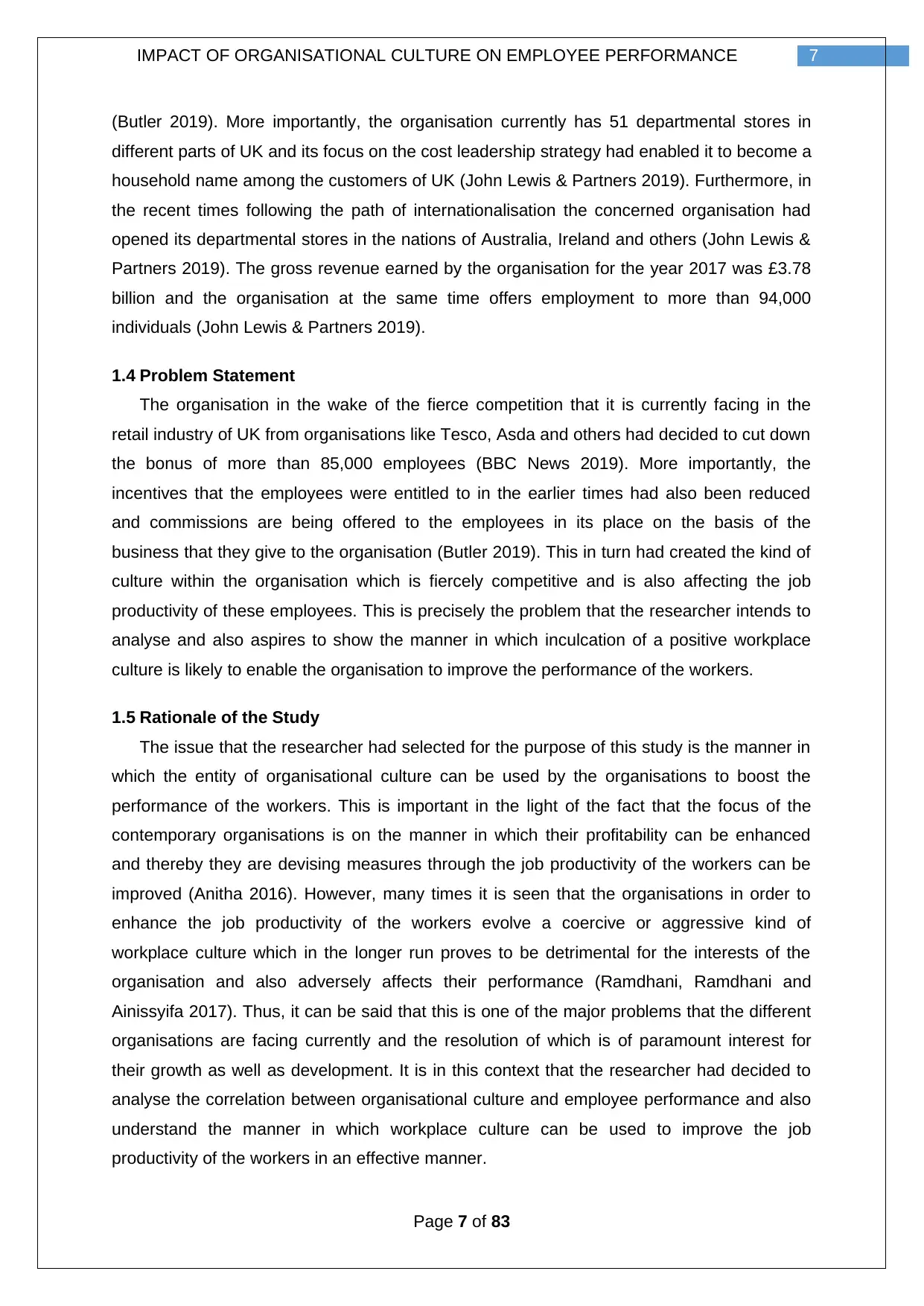
7IMPACT OF ORGANISATIONAL CULTURE ON EMPLOYEE PERFORMANCE
(Butler 2019). More importantly, the organisation currently has 51 departmental stores in
different parts of UK and its focus on the cost leadership strategy had enabled it to become a
household name among the customers of UK (John Lewis & Partners 2019). Furthermore, in
the recent times following the path of internationalisation the concerned organisation had
opened its departmental stores in the nations of Australia, Ireland and others (John Lewis &
Partners 2019). The gross revenue earned by the organisation for the year 2017 was £3.78
billion and the organisation at the same time offers employment to more than 94,000
individuals (John Lewis & Partners 2019).
1.4 Problem Statement
The organisation in the wake of the fierce competition that it is currently facing in the
retail industry of UK from organisations like Tesco, Asda and others had decided to cut down
the bonus of more than 85,000 employees (BBC News 2019). More importantly, the
incentives that the employees were entitled to in the earlier times had also been reduced
and commissions are being offered to the employees in its place on the basis of the
business that they give to the organisation (Butler 2019). This in turn had created the kind of
culture within the organisation which is fiercely competitive and is also affecting the job
productivity of these employees. This is precisely the problem that the researcher intends to
analyse and also aspires to show the manner in which inculcation of a positive workplace
culture is likely to enable the organisation to improve the performance of the workers.
1.5 Rationale of the Study
The issue that the researcher had selected for the purpose of this study is the manner in
which the entity of organisational culture can be used by the organisations to boost the
performance of the workers. This is important in the light of the fact that the focus of the
contemporary organisations is on the manner in which their profitability can be enhanced
and thereby they are devising measures through the job productivity of the workers can be
improved (Anitha 2016). However, many times it is seen that the organisations in order to
enhance the job productivity of the workers evolve a coercive or aggressive kind of
workplace culture which in the longer run proves to be detrimental for the interests of the
organisation and also adversely affects their performance (Ramdhani, Ramdhani and
Ainissyifa 2017). Thus, it can be said that this is one of the major problems that the different
organisations are facing currently and the resolution of which is of paramount interest for
their growth as well as development. It is in this context that the researcher had decided to
analyse the correlation between organisational culture and employee performance and also
understand the manner in which workplace culture can be used to improve the job
productivity of the workers in an effective manner.
Page 7 of 83
(Butler 2019). More importantly, the organisation currently has 51 departmental stores in
different parts of UK and its focus on the cost leadership strategy had enabled it to become a
household name among the customers of UK (John Lewis & Partners 2019). Furthermore, in
the recent times following the path of internationalisation the concerned organisation had
opened its departmental stores in the nations of Australia, Ireland and others (John Lewis &
Partners 2019). The gross revenue earned by the organisation for the year 2017 was £3.78
billion and the organisation at the same time offers employment to more than 94,000
individuals (John Lewis & Partners 2019).
1.4 Problem Statement
The organisation in the wake of the fierce competition that it is currently facing in the
retail industry of UK from organisations like Tesco, Asda and others had decided to cut down
the bonus of more than 85,000 employees (BBC News 2019). More importantly, the
incentives that the employees were entitled to in the earlier times had also been reduced
and commissions are being offered to the employees in its place on the basis of the
business that they give to the organisation (Butler 2019). This in turn had created the kind of
culture within the organisation which is fiercely competitive and is also affecting the job
productivity of these employees. This is precisely the problem that the researcher intends to
analyse and also aspires to show the manner in which inculcation of a positive workplace
culture is likely to enable the organisation to improve the performance of the workers.
1.5 Rationale of the Study
The issue that the researcher had selected for the purpose of this study is the manner in
which the entity of organisational culture can be used by the organisations to boost the
performance of the workers. This is important in the light of the fact that the focus of the
contemporary organisations is on the manner in which their profitability can be enhanced
and thereby they are devising measures through the job productivity of the workers can be
improved (Anitha 2016). However, many times it is seen that the organisations in order to
enhance the job productivity of the workers evolve a coercive or aggressive kind of
workplace culture which in the longer run proves to be detrimental for the interests of the
organisation and also adversely affects their performance (Ramdhani, Ramdhani and
Ainissyifa 2017). Thus, it can be said that this is one of the major problems that the different
organisations are facing currently and the resolution of which is of paramount interest for
their growth as well as development. It is in this context that the researcher had decided to
analyse the correlation between organisational culture and employee performance and also
understand the manner in which workplace culture can be used to improve the job
productivity of the workers in an effective manner.
Page 7 of 83
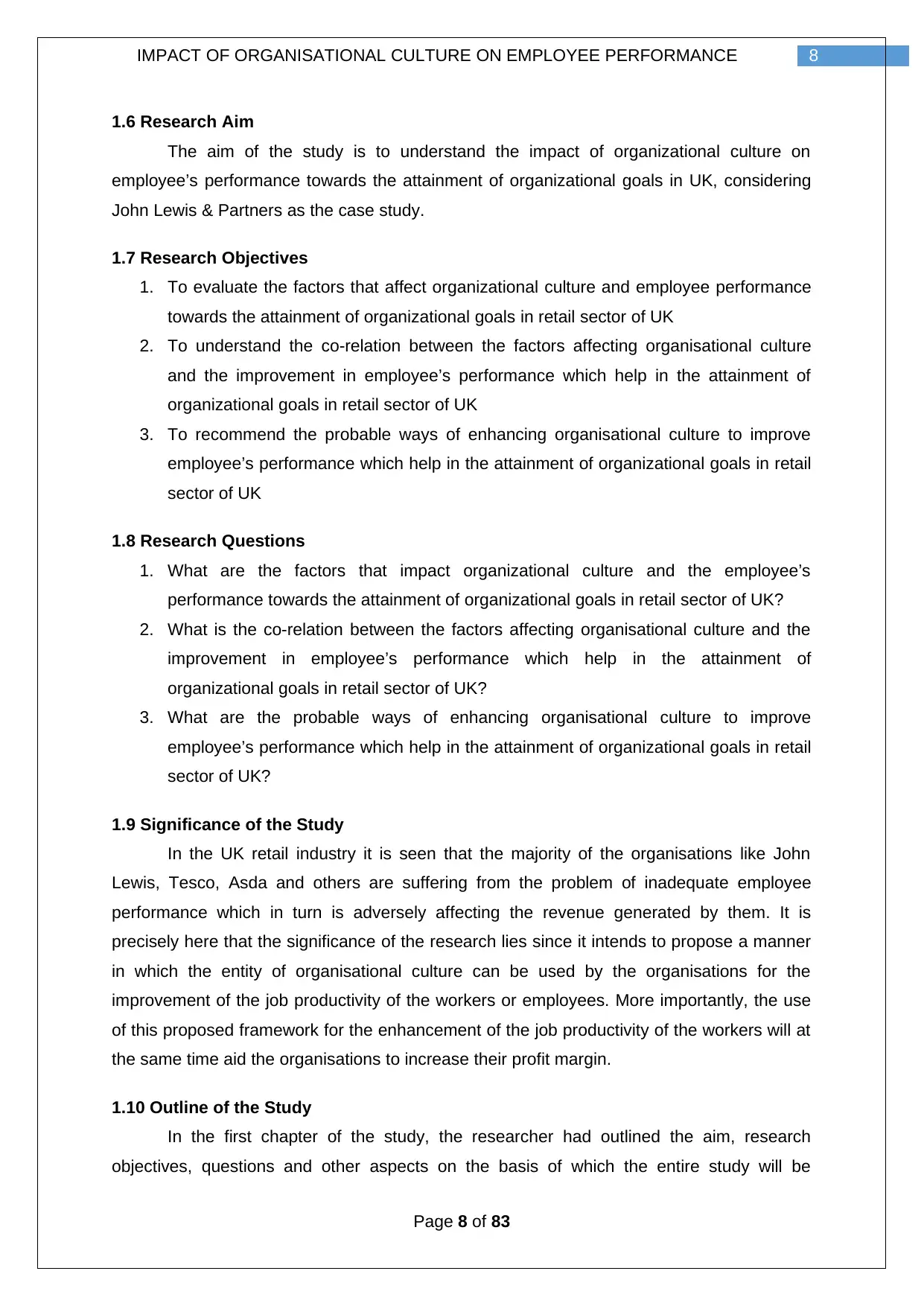
8IMPACT OF ORGANISATIONAL CULTURE ON EMPLOYEE PERFORMANCE
1.6 Research Aim
The aim of the study is to understand the impact of organizational culture on
employee’s performance towards the attainment of organizational goals in UK, considering
John Lewis & Partners as the case study.
1.7 Research Objectives
1. To evaluate the factors that affect organizational culture and employee performance
towards the attainment of organizational goals in retail sector of UK
2. To understand the co-relation between the factors affecting organisational culture
and the improvement in employee’s performance which help in the attainment of
organizational goals in retail sector of UK
3. To recommend the probable ways of enhancing organisational culture to improve
employee’s performance which help in the attainment of organizational goals in retail
sector of UK
1.8 Research Questions
1. What are the factors that impact organizational culture and the employee’s
performance towards the attainment of organizational goals in retail sector of UK?
2. What is the co-relation between the factors affecting organisational culture and the
improvement in employee’s performance which help in the attainment of
organizational goals in retail sector of UK?
3. What are the probable ways of enhancing organisational culture to improve
employee’s performance which help in the attainment of organizational goals in retail
sector of UK?
1.9 Significance of the Study
In the UK retail industry it is seen that the majority of the organisations like John
Lewis, Tesco, Asda and others are suffering from the problem of inadequate employee
performance which in turn is adversely affecting the revenue generated by them. It is
precisely here that the significance of the research lies since it intends to propose a manner
in which the entity of organisational culture can be used by the organisations for the
improvement of the job productivity of the workers or employees. More importantly, the use
of this proposed framework for the enhancement of the job productivity of the workers will at
the same time aid the organisations to increase their profit margin.
1.10 Outline of the Study
In the first chapter of the study, the researcher had outlined the aim, research
objectives, questions and other aspects on the basis of which the entire study will be
Page 8 of 83
1.6 Research Aim
The aim of the study is to understand the impact of organizational culture on
employee’s performance towards the attainment of organizational goals in UK, considering
John Lewis & Partners as the case study.
1.7 Research Objectives
1. To evaluate the factors that affect organizational culture and employee performance
towards the attainment of organizational goals in retail sector of UK
2. To understand the co-relation between the factors affecting organisational culture
and the improvement in employee’s performance which help in the attainment of
organizational goals in retail sector of UK
3. To recommend the probable ways of enhancing organisational culture to improve
employee’s performance which help in the attainment of organizational goals in retail
sector of UK
1.8 Research Questions
1. What are the factors that impact organizational culture and the employee’s
performance towards the attainment of organizational goals in retail sector of UK?
2. What is the co-relation between the factors affecting organisational culture and the
improvement in employee’s performance which help in the attainment of
organizational goals in retail sector of UK?
3. What are the probable ways of enhancing organisational culture to improve
employee’s performance which help in the attainment of organizational goals in retail
sector of UK?
1.9 Significance of the Study
In the UK retail industry it is seen that the majority of the organisations like John
Lewis, Tesco, Asda and others are suffering from the problem of inadequate employee
performance which in turn is adversely affecting the revenue generated by them. It is
precisely here that the significance of the research lies since it intends to propose a manner
in which the entity of organisational culture can be used by the organisations for the
improvement of the job productivity of the workers or employees. More importantly, the use
of this proposed framework for the enhancement of the job productivity of the workers will at
the same time aid the organisations to increase their profit margin.
1.10 Outline of the Study
In the first chapter of the study, the researcher had outlined the aim, research
objectives, questions and other aspects on the basis of which the entire study will be
Page 8 of 83
⊘ This is a preview!⊘
Do you want full access?
Subscribe today to unlock all pages.

Trusted by 1+ million students worldwide
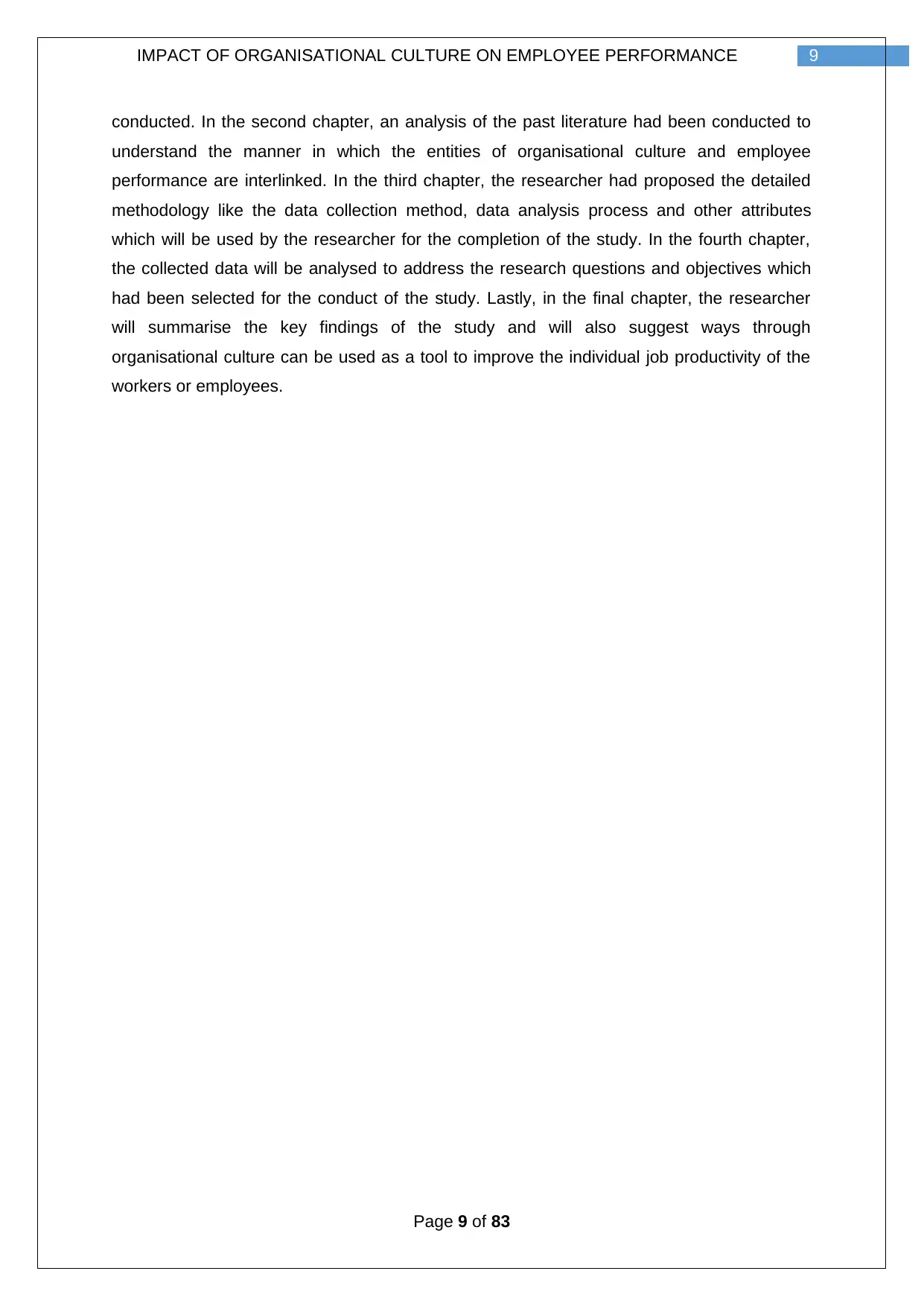
9IMPACT OF ORGANISATIONAL CULTURE ON EMPLOYEE PERFORMANCE
conducted. In the second chapter, an analysis of the past literature had been conducted to
understand the manner in which the entities of organisational culture and employee
performance are interlinked. In the third chapter, the researcher had proposed the detailed
methodology like the data collection method, data analysis process and other attributes
which will be used by the researcher for the completion of the study. In the fourth chapter,
the collected data will be analysed to address the research questions and objectives which
had been selected for the conduct of the study. Lastly, in the final chapter, the researcher
will summarise the key findings of the study and will also suggest ways through
organisational culture can be used as a tool to improve the individual job productivity of the
workers or employees.
Page 9 of 83
conducted. In the second chapter, an analysis of the past literature had been conducted to
understand the manner in which the entities of organisational culture and employee
performance are interlinked. In the third chapter, the researcher had proposed the detailed
methodology like the data collection method, data analysis process and other attributes
which will be used by the researcher for the completion of the study. In the fourth chapter,
the collected data will be analysed to address the research questions and objectives which
had been selected for the conduct of the study. Lastly, in the final chapter, the researcher
will summarise the key findings of the study and will also suggest ways through
organisational culture can be used as a tool to improve the individual job productivity of the
workers or employees.
Page 9 of 83
Paraphrase This Document
Need a fresh take? Get an instant paraphrase of this document with our AI Paraphraser
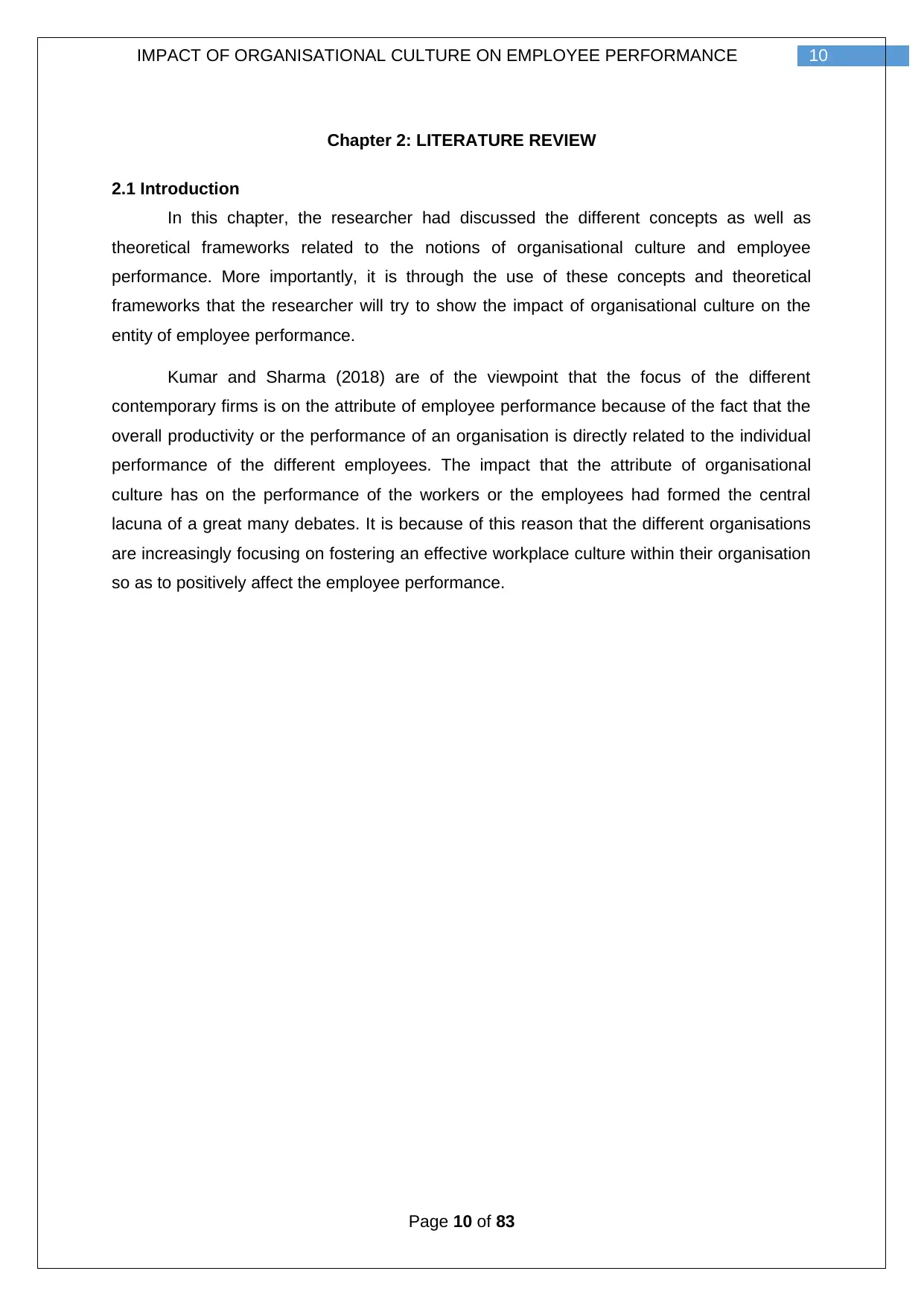
10IMPACT OF ORGANISATIONAL CULTURE ON EMPLOYEE PERFORMANCE
Chapter 2: LITERATURE REVIEW
2.1 Introduction
In this chapter, the researcher had discussed the different concepts as well as
theoretical frameworks related to the notions of organisational culture and employee
performance. More importantly, it is through the use of these concepts and theoretical
frameworks that the researcher will try to show the impact of organisational culture on the
entity of employee performance.
Kumar and Sharma (2018) are of the viewpoint that the focus of the different
contemporary firms is on the attribute of employee performance because of the fact that the
overall productivity or the performance of an organisation is directly related to the individual
performance of the different employees. The impact that the attribute of organisational
culture has on the performance of the workers or the employees had formed the central
lacuna of a great many debates. It is because of this reason that the different organisations
are increasingly focusing on fostering an effective workplace culture within their organisation
so as to positively affect the employee performance.
Page 10 of 83
Chapter 2: LITERATURE REVIEW
2.1 Introduction
In this chapter, the researcher had discussed the different concepts as well as
theoretical frameworks related to the notions of organisational culture and employee
performance. More importantly, it is through the use of these concepts and theoretical
frameworks that the researcher will try to show the impact of organisational culture on the
entity of employee performance.
Kumar and Sharma (2018) are of the viewpoint that the focus of the different
contemporary firms is on the attribute of employee performance because of the fact that the
overall productivity or the performance of an organisation is directly related to the individual
performance of the different employees. The impact that the attribute of organisational
culture has on the performance of the workers or the employees had formed the central
lacuna of a great many debates. It is because of this reason that the different organisations
are increasingly focusing on fostering an effective workplace culture within their organisation
so as to positively affect the employee performance.
Page 10 of 83
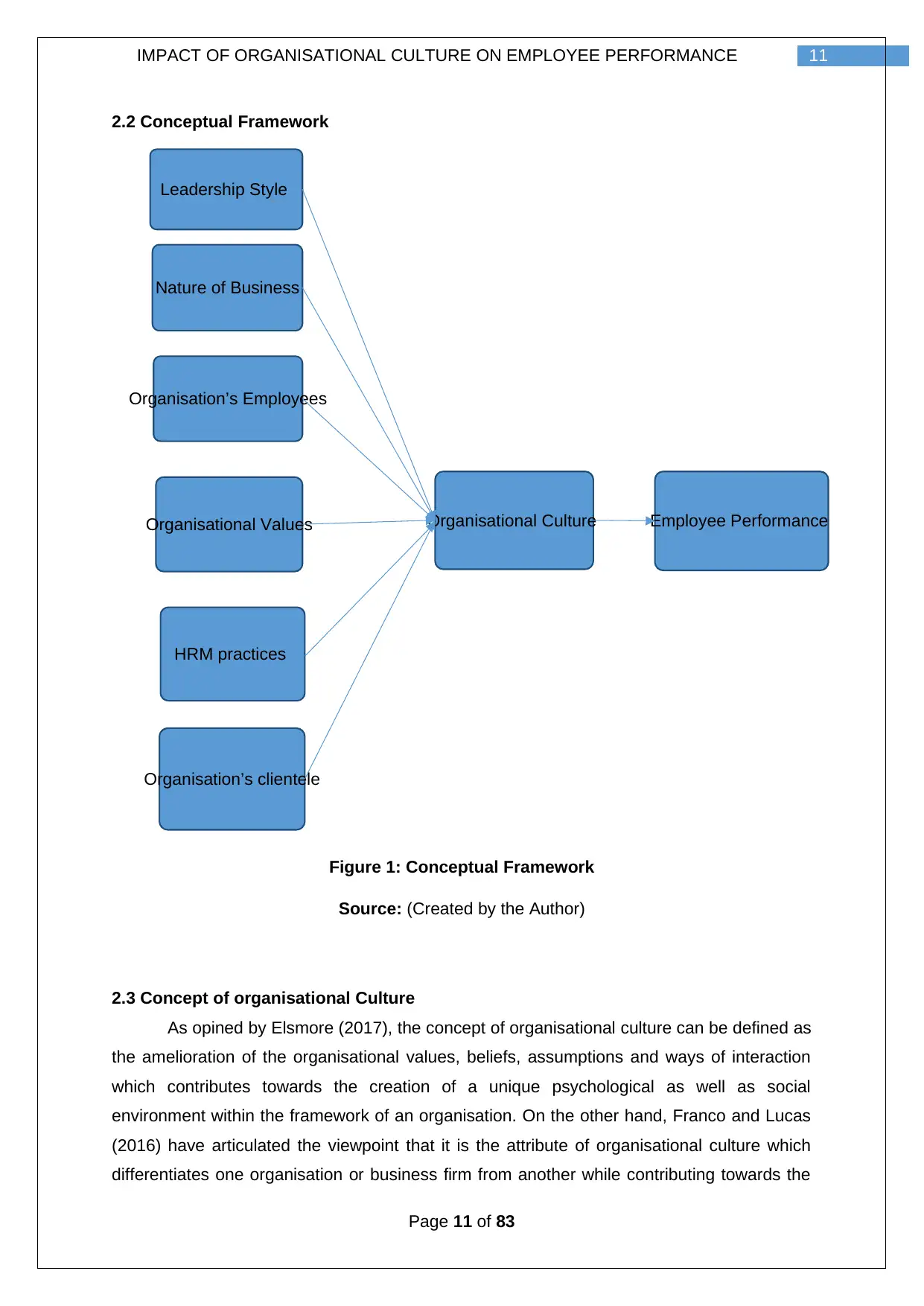
11IMPACT OF ORGANISATIONAL CULTURE ON EMPLOYEE PERFORMANCE
Leadership Style
Nature of Business
Organisation’s Employees
Organisational Values Organisational Culture
HRM practices
Organisation’s clientele
Employee Performance
2.2 Conceptual Framework
Figure 1: Conceptual Framework
Source: (Created by the Author)
2.3 Concept of organisational Culture
As opined by Elsmore (2017), the concept of organisational culture can be defined as
the amelioration of the organisational values, beliefs, assumptions and ways of interaction
which contributes towards the creation of a unique psychological as well as social
environment within the framework of an organisation. On the other hand, Franco and Lucas
(2016) have articulated the viewpoint that it is the attribute of organisational culture which
differentiates one organisation or business firm from another while contributing towards the
Page 11 of 83
Leadership Style
Nature of Business
Organisation’s Employees
Organisational Values Organisational Culture
HRM practices
Organisation’s clientele
Employee Performance
2.2 Conceptual Framework
Figure 1: Conceptual Framework
Source: (Created by the Author)
2.3 Concept of organisational Culture
As opined by Elsmore (2017), the concept of organisational culture can be defined as
the amelioration of the organisational values, beliefs, assumptions and ways of interaction
which contributes towards the creation of a unique psychological as well as social
environment within the framework of an organisation. On the other hand, Franco and Lucas
(2016) have articulated the viewpoint that it is the attribute of organisational culture which
differentiates one organisation or business firm from another while contributing towards the
Page 11 of 83
⊘ This is a preview!⊘
Do you want full access?
Subscribe today to unlock all pages.

Trusted by 1+ million students worldwide
1 out of 83
Related Documents
Your All-in-One AI-Powered Toolkit for Academic Success.
+13062052269
info@desklib.com
Available 24*7 on WhatsApp / Email
![[object Object]](/_next/static/media/star-bottom.7253800d.svg)
Unlock your academic potential
Copyright © 2020–2026 A2Z Services. All Rights Reserved. Developed and managed by ZUCOL.





